Last Updated on July 7, 2020 by Michelle
Raising barn kittens is one of those sweet experiences on our farm that my family has thoroughly enjoyed. We’ve also learned a lot about the process over the years, including 5 things anyone who is raising barn kittens needs to know.
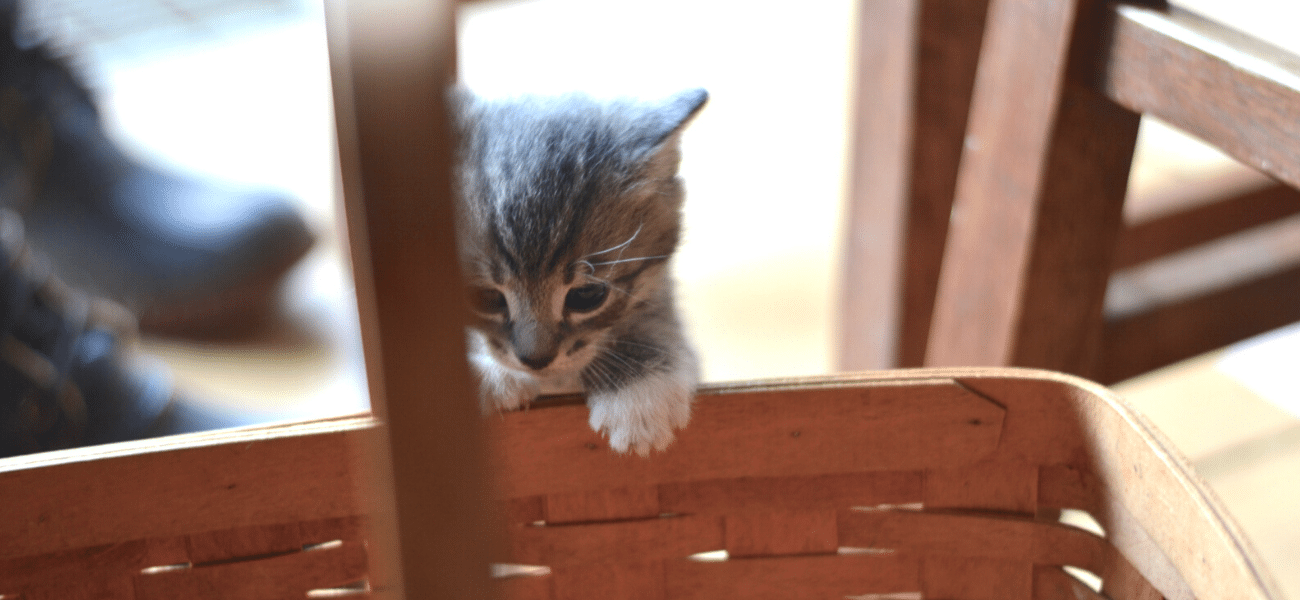
Our latest barn-cat momma cause quite a stir, and a bunch of worry, around the farm this week, so I thought I’d share the story.
Meet E.B., barn cat momma extraordinaire
The momma is a deep gray, green eyed, valuable mouse-capturing member of our farm crew here on our New England homestead. We dubbed her E.B., tongue in cheek after E.B. White, since she’s deep gray and always on the hunt for Stuart Little for breakfast. And she was proving to be a fantastic new momma to her litter. Until we realized her over-attentiveness was a problem…
Six weeks ago, E.B. had chosen what appeared to be the quintessential best corner of any barn attic to ever give birth to five sweet kitties. We discovered the balls of cuteness nursing contentedly in what we call “the dark room,” in the attic above our old carriage house. (Go here if you’d like to know what a carriage house is in an old New England farmhouse.)
Some previous owner of our 200-year-old farmhouse had built a closet area in the attic that quickly became “the dark room” for my daughters, who set up a screen printing station in the pitch-dark area–as a perfect little room for drying emulsion, without any chance of light exposure.
The small, tucked-away, contained area must have seemed ideal to E.B. who had her kittens best interests at heart, wanting to control their wanderings and keep them safe. And it seemed ideal to me too. Until earlier this week, when we all panicked.
We thought the barn kittens were blind
One afternoon, while checking in on the balls of fluff, we toted them all to our warm kitchen, to let them stretch their legs. That’s when noticed their eyes looked odd and they didn’t acknowledge the movements of our hands in front of their faces.
And, at almost 5 weeks old, they had little desire to explore their exciting surroundings. When they did take a few timid, very wobbly steps, they had their little noses to the ground, relying on their sense of smell like a dog, and quickly hid behind one of the many safe-feeling barriers around our farmhouse kitchen.
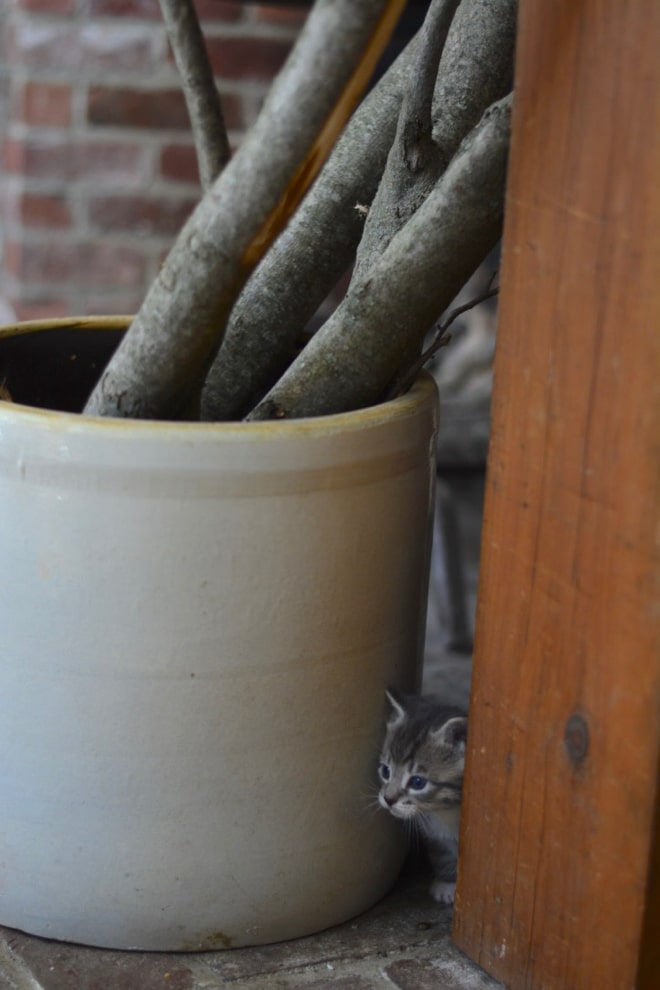
Ideally, at about three weeks old, kittens start to explore their environments, and momma encourages her kittens to learn from experience. She’ll sometimes make a strange sound to call back those who have strayed too far. By a month old, the kittens should be “walking like the big cats,” then playing, jumping, and climbing by six weeks.
But this litter of barn kittens had been completely sheltered by momma and subjected to complete darkness for 5 weeks.
Studies of blindness in kittens
I immediately did some googling and got more worried the more I read. The abstract of this study explained, “visual experience early in life is critical for the refinement of retinal circuits and for appropriate signaling of the spatiotemporal properties of visual stimuli, thus influencing the response properties of neurons in higher visual centers and their processing of visual information.”
And another study explained, “When imposed within a critical period that ends at about 10 weeks of age, darkness exerts severe effects on vision”
We moved the litter to a nice spot down in the barn, planned on watching them closely in the days ahead, and hoped that by removing them from the total darkness their eyes would learn to work properly.
Within an hour we realized E.B. had moved them all and panicked when we realized they were not back in “the dark room.” We spent the next half hour hunting high and low and finally hearing a whimpered tiny meow between the floor boards of the barn. Then we spent another half an hour finding how to rescue them from the tiny obscure pocket in the floor that their momma had deposited them. I have no idea why E.B. was so intent on keeping them tucked away in darkness, but I’m sure she was protecting them in her mind, because she’s attentive to their needs, leaving them only when it’s time for herself to hunt for food.
Once we managed to precariously rescue all the kittens, we carried them back to the kitchen, in a basket, to evaluate them as well as our next move.
They barely moved in the basket, stretching a little but not attempting to climb out; very unusual for kittens their age. They did seem to “look” at things but we quickly realized they were responding to noise, not light.
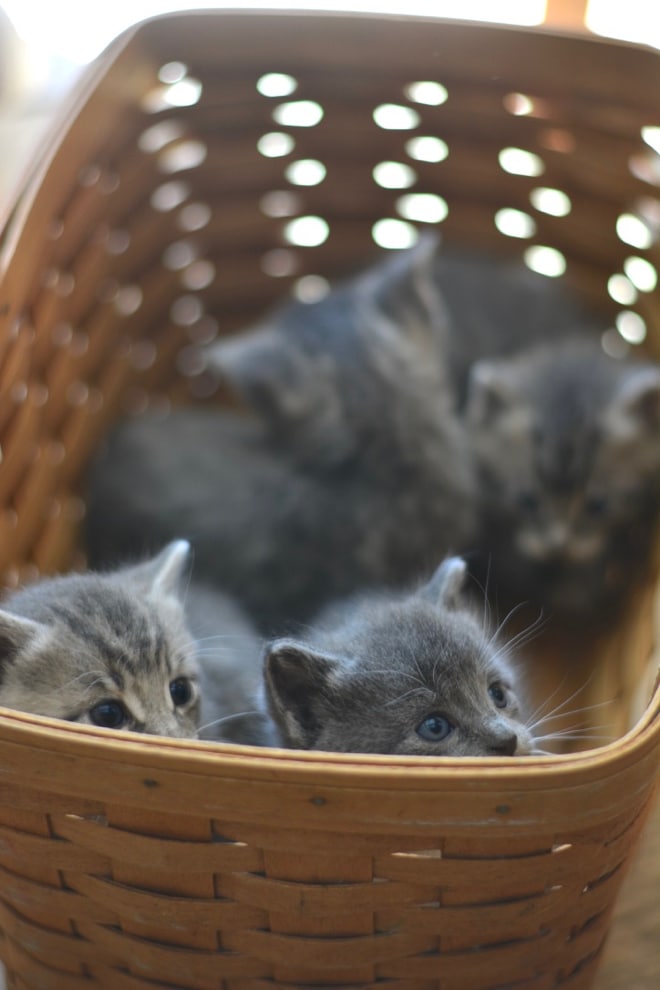
We relocated our kittens, to a well-lit area
We tried, successfully, to feed them milk with a medicine dropper while googling more and reading that sometimes some sight damage can repair itself and often poor sighted kitties can adapt, so we knew we needed a plan to help these precious little balls of timidness as best we could. At first we thought it would mean separating them from momma (since they could drink milk on their own), but we quickly came up with a better plan. We wanted them to have momma’s milk if possible, as well as her valuable instruction, teaching them to hunt for food in the weeks ahead, knowing they would never have a productive life if we simply sheltered them more.
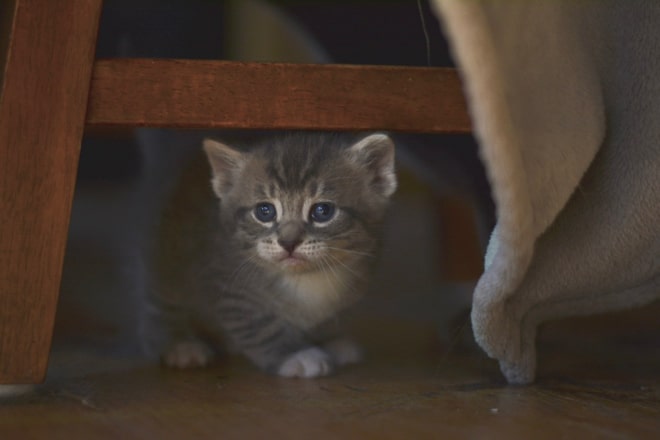
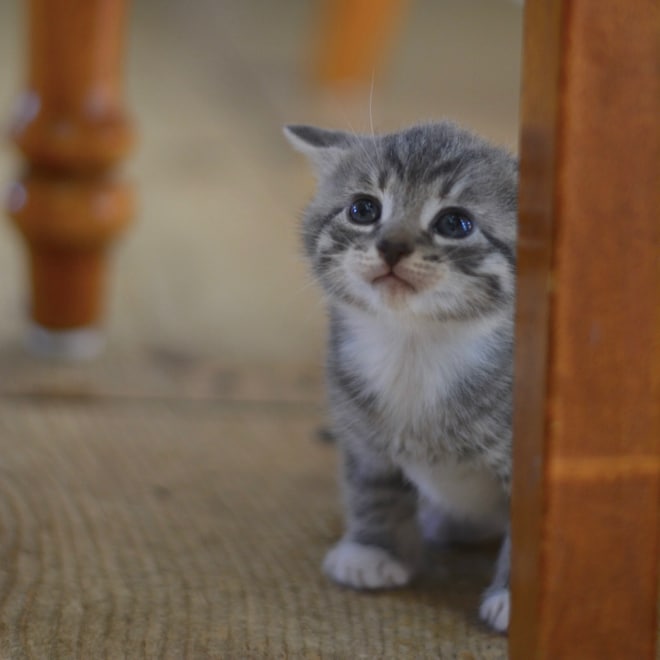
So we found an old dog cage and made a litter box and set them up on our front screened porch and prayed their eyes would start to improve.
By the time we had done all this, and spent a lot of time cuddling and playing with the kittens, they very slowly had started to explore our kitchen.
By the next day, they were exploring the front porch a little more and sniffing the ground less as they did so, all the while their unsure wobbly legs getting stronger.
All are now doing well
We are still checking in on all often, and letting E.B. out whenever she asks, although she seems content to use the litter box if we don’t notice her request. When she goes exploring, she always returns in a half hour or so and wants back in with her kittens. Realizing she was unable to move them elsewhere this time, and also realizing they were indeed contained, she has settled in well to her new, temporary abode. Which is exceptionally odd because of all our barn cats, E.B. has always been the most independent and the one who hated ever being forced inside.
By the end of their first day living in the bright natural light of our front porch, the kittens appeared to be seeing better. If their vision is less than perfect, and they have just adapted, I guess we’ll never know, but I’m confident we realized the problem early enough that all are going to be fine.
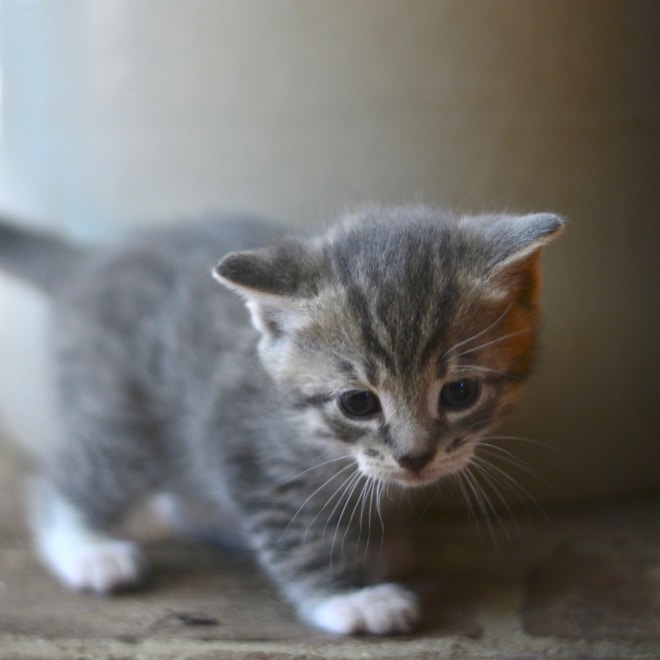
Raising Barn Kittens–5 things you need to know
1. Kittens are blind for the first 7-10 days of their life.
So their location can be totally dark at that stage and all is fine. In retrospect, I would have, of course, intervened in E.B.s choices many weeks sooner than I did. It just never crossed my mind that vision can’t develop in total darkness.
2. Barn cat moms can be determined.
When you take them out too young, or take them where momma doesn’t want them, be prepared that she may hide them away. Really well. In retrospect, I would have been more creative that first time that we moved them or at least never taken my eyes off of E.B. until I was sure she was going to settle in fine to the new location.
3. Barn cat moms can make big mistakes.
Think about where momma has them, whatever stage their at, and relocate them (with watchful attentiveness) if it’s not a good location. On one hand, I still will always trust a momma’s instincts at first, but on the other hand, I now know from experience that animal mommas will err, just as us human mommas sure do from time to time, yes?
4. Excessive darkness can lead to blindness in kittens.
I feel so inadequate that this never crossed my mind. I often thought what a great, safe haven E.B. had made for her littles. Since I never thought of this problem, I assume you may not either, so please take my warning and learn from my failures.
5. Give barn kittens lots of love. Often.
Whether their sight is perfect or not (due to being new borns or stuck in darkness), handle kittens often, pet them, and play with them. We do this weird thing where we will constantly turn kittens onto their backs and make them lay still in the crock of our arms for a few seconds. No idea why we first started doing this, except maybe it protected us from random kitten scratches. But it’s turned out to be a great way to get the kittens used to being handled by people, which has been invaluable to friends, family, and neighbors who have adopted our kittens. They’re great hunters (therefore earn their keep around a farm) but also cats who do well around people. We pride ourselves on raising friendly barn cats who don’t mind sharing their barn with people.
Meet Some Other Newborn Kittens
Meet our very first litter of barn kittens, many years ago here on the farm:
Other articles that will encourage or help you:
12 things to ask yourself if you think you want a farm.
My mistake that killed my hens.
A big mistake I made when incubating eggs.
The attitude you must have if you’re considering homesteading.
4 questions successful parents ask themselves.
He will not judge by what he sees with his eyes, or decide by what he hears with his ears; but with righteousness he will judge the needy, with justice he will give decisions for the poor of the earth… Righteousness will be his belt and faithfulness the sash around his waist. Isaiah 11: 3-5
Pin this for later!
Click on the image below to pin this post.
Find out why SoulyRested was considered to be one of the Top 20 Must-Read Homesteading Blogs of 2018 and then one of the Top Homesteading Blogs of 2019 as well.
I’d love to connect!
To find me in some other neck of the woods, just click any (or every!) icon below:
And please follow along!


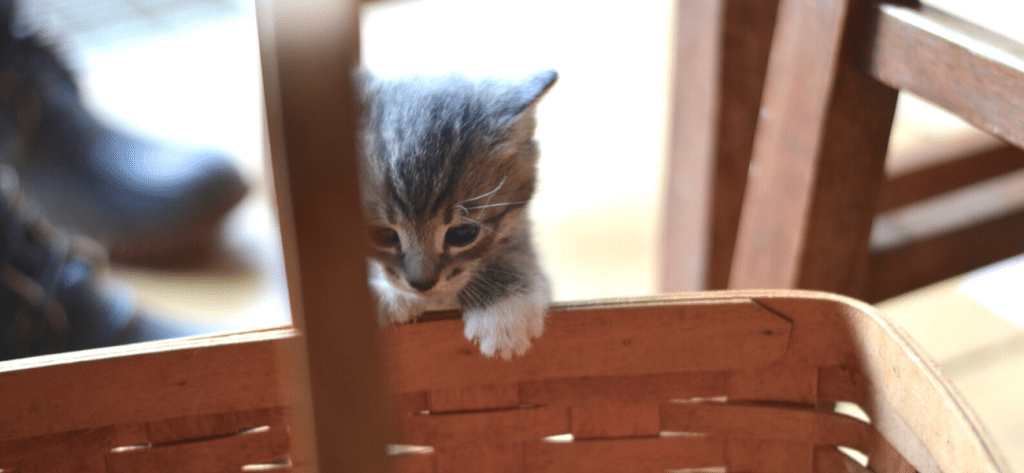
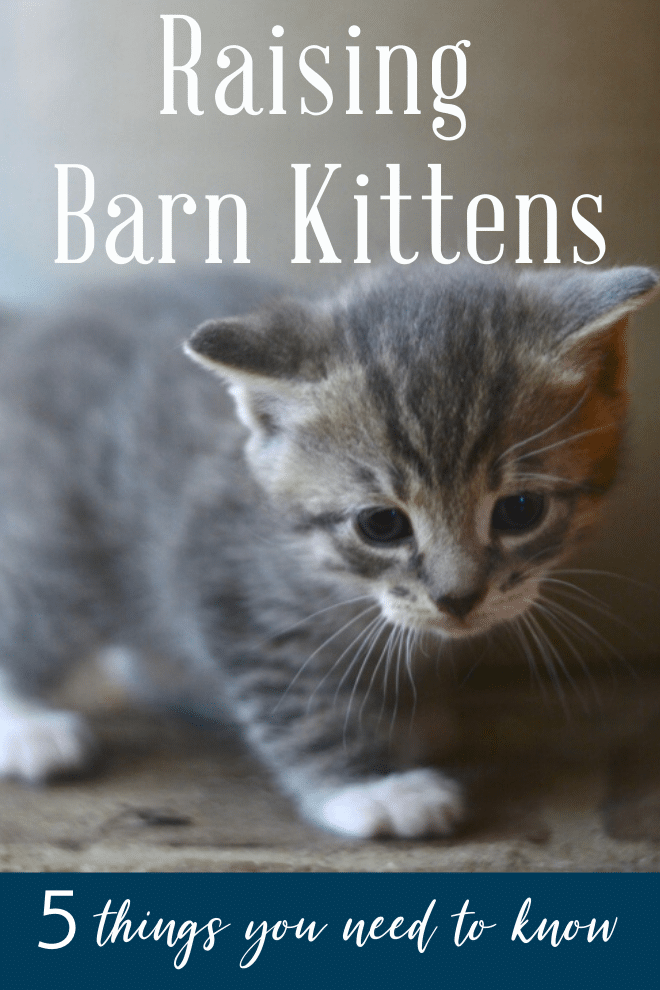





What a great story and useful information! I love this, and I’m so glad your kittens are doing well. Thank you for sharing this with us. We’re adding another barn cat to our place too….and right now the momma has them in pseudo darkness. Perhaps I should talk with my neighbor, who has them all right now. They’re three weeks old.
Thank you Heidi, I am so thankful as well! Two of them just went to their forever home today. Two more will go this week. They are all doing very well. 🙂
I just got 2 newly weaned kittens . I plan for them to be barn cats to keep mice clear of the horse feed. They are about 8-10 weeks old. I was told to put them in a kennel in the barn since that is where they were when with momma. It’s starting to get hot and humid so are they too young to be left there. Or when should I put them in the barn?
I’d go with the barn, maybe there’s a cool spot for the kennel? Or if you’re down south and it’s truly just too hot you could keep them indoors for a few weeks, spending time with them outside daily so they get the “lay of the land” and give them morning and evening hours in the kennel, and in the night.
Thank you for sharing your experiences! We are new farm-owners and are adopting a few kittens in the coming weeks. The kittens will be 8-10 weeks old. I would love tips/direction on how to transition the kitties to farm cats.
how sweet… kitties are SO fun, but if it’s possible I would recommend they stay with momma a few more weeks… she’s the absolute best teacher. in the 10-12 week old window they become independent hunters, well, sorta, with momma’s help. Other than that I just recommend containing them in the area you want them to sleep and give them lots of wonderful milk and good food so they know where “home” is. Slowly give less food and milk as they get older and more acclimated to their new home and hunting on their own.
My local humane society has feral cats they adopt as “working cats”. Do you have any experience on this? I’ve thought about adopting 2 adult cats for barn cats. It’s getting cold here and worried they might get too cold in our run-in barn area during the 2 weeks they say to confine them to a kennel.
Thoughts? Thanks
I don’t have experience with feral cats, but I know, depending on their stories, it can be very difficult to ever socialize a feral cat. I know White House on the Hill had a feral kitty that they created a youtube video about… maybe their experience would help you decide… but i wouldn’t worry about the weather, as long as they’re out of the elements and not in direct cold winds… kitties can stay quite warm and their fur gets quite thick in cold seasons.
I just came over here from Lumnah Acres, they got two barn cats from you. I thought he said you blogged about what to feed your barn cats. I haven’t found that yet
We have 5 beautiful barn cats for our farm, but I always struggle to know am I feeding them too much or not enough. We r in MN so of course our winters r very cold, so I always supplement morning and night with cat food
Do u have info on what to feed them, how much, and how can u tell if u r feeding ur barn cats too much that they stop their desire to hunt?
Thanks!
Hi Vivian, nice to meet you. I have shared all of that over on instagram and in a few places here, on the blog… essentially we always increase their available food in the winter, as hunting becomes more scarce for them. But we do have various critters in the walls of our old farmhouse in the winter, so the cats do still stay “on duty,” it’s just more in the barn and attic and less outside. If your barn cats are friendly and often “around” you’ll know if they stop hunting and maybe need a little less kibble available. (We see our cats in the act of hunting and sitting back enjoying their snacks often.) As far as the best kibble I’ve been able to find at a reasonable price, in my research… that is linked to here: https://soulyrested.com/cat/ Hope all of that helps!